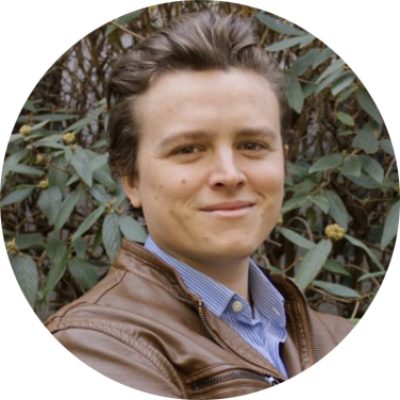
Timothy Aikin
Despite decades of molecular study, many of the earliest events in the development of human cancers remain unexplored. For example, nearly a third of human tumors undergo whole genome duplication [WGD] that can increase cancer cell fitness, but it is not known how or when these tetraploid cancers arise. This is because cancer onset, or oncogenesis, is unpredictable and may occur in just one or a few cells in an otherwise healthy tissue. In the Regot lab, we use live imaging of biosensors to dissect the signaling events that underlie these rare events. This approach allowed me to observe the effects of cancer mutations on cell signaling and the cell cycle. I found that oncogenic WGD results from inappropriate inactivation of cell cycle machinery and mitosis skipping. These skipped cells are primed for reentry into the cell cycle, despite having double the normal DNA content. I found that the same common mutations are associated with WGD in human lung adenocarcinomas and demonstrated that these oncogenes can cause WGD in primary human airway cells. These findings revealed the mechanism and timing of a key event in oncogenesis, whole genome duplication, which is a turning point in the development of aggressive cancers.
Questions & Answers
Why did you choose Johns Hopkins for your work? When deciding on graduate schools, I was looking for an institution with excellent quality of research and a strong intellectual community. I was impressed by the openness of faculty to embracing new ideas and supporting student success. In addition, the students that I met through Johns Hopkins are creative and motivated, and many have become close friends. What does receiving this award mean to you personally and professionally? Do you have any connection with the particular award you received? I have looked up to many previous winners of the Young Investigators’ awards as exceptional researchers, fantastic mentors and inspiring colleagues. Because of my interactions with previous awardees, I have always respected the awards and the achievements that they represent. I’m honored to be included in the company of fellow Mette Strand awardees, and I will take motivation from Dr. Strand to continue to apply the tools of molecular biology to the understanding of human disease. What contributed to your project’s success? (Special skills, interests, opportunities, guidance, etc.) My projects in the Regot lab involved applying new technologies to observe fundamental processes in cancer development. With these new tools, we observed surprising events and behaviors that required rethinking the path healthy cells take to become cancers. It was deeply satisfying to work out the mechanistic details and think about the consequences of these events. That work required Sergi [Regot] and I to embrace uncertainty and take an adaptive approach to designing experiments in which we were constantly testing new ideas. Throughout this process, Sergi has been an incredibly supportive and creative mentor, and has helped me to grow into a skilled, independent scientist. I was also constantly encouraged by my lab mates and guided by the community of talented scientists in the MBG [molecular biology and genetics] department and BCMB [biochemistry, cellular and molecular biology] graduate program. What thoughts do you have about Young Investigators’ Day itself, as a celebration of the roles students and fellows play in research at Hopkins? The Hopkins research community is exceptionally supportive of trainees, and I’ve always felt that my ideas and questions are taken seriously by anyone from grad students and postdocs to faculty. It’s a pleasure to do research in a place where the contributions of students are recognized and celebrated by Young Investigators’ Day. What has been your best/most memorable experience while at Hopkins? There have been many mornings when I rushed into the lab to check the results of my imaging experiment from the night before. A few of these events stand out to me because of the thrill of executing a well-planned experiment and getting a clear result that changed the course of my projects. These will always be some of my favorite moments from my time in the Regot lab. What are your plans over the next year or so? Graduating, looking for faculty positions, etc.? I’m looking forward to graduating and finding the next interesting problem to work on! Tell me something interesting about yourself that makes you unique. Do you have any special hobbies, interests or life experiences? My friends laugh at me for having too many hobbies. In graduate school alone, I’ve filled a bookshelf reading and a sketchbook painting, I’ve packed my deck gardening, returned to gaming and camped through the summers. I’ve also become a motorcyclist, a fly fisherman and a, (passable) chef.